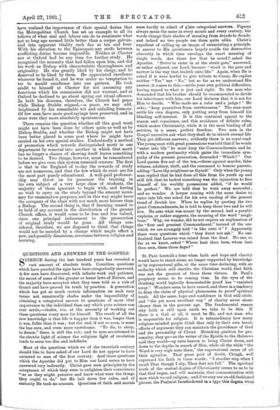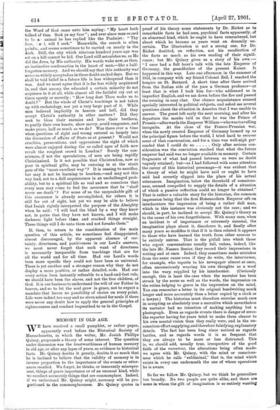QUESTIONS AND ANSWERS IN THE GOSPELS.
SCIENCE during the last hundred years has revealed a vast amount of absolute truth. Countless questions which have puzzled the ages have been categorically answered. A few men have discovered, with infinite work and patience, the secret of some of the greater or lesser laws of Nature, and the majority have accepted what they were told as a rule of thumb and have proved its truth by practice. A generation which has got so much certain information on such easy terms not unnaturally chafes under the impossibility of obtaining a categorical answer to questions of more vital importance to the individual than any which pure science can ever settle,—chafes, too, at the necessity of working out these questions every man for himself. The result of all the new knowledge is that life is happier than it was, longer than it was, fuller than it was ; but the end, if not so soon, is none the less sure, and even more unwelcome. "To die, to sleep, to dream," there is still the rub; and to eyes accustomed to the electric light of science the religious light of revelation tends to seem too dim and indefinite.
Most of the questions which we of the twentieth century should like to have asked of our Lord do not appear to have occurred to men of the first century. And those questions which the Apostles did put to Him our Lord seems to have answeYed very indirectly. Christ gave men principles by the acceptance of which they were to enlighten their consciences *" so as they might perceive and know what were the things they ought to do," but He laid down few rules, and of curiosity He took no account. Questions of faith and morals
seem hardly to admit of r.:ain categorical answers. . Figures always mean the same in every mouth and every century, but words change their shades of meaning from decade to decade, and indeed no two people use them quite alike. Christ's expedient of calling up an image, of enunciating a principle, in answer to His questioners largely avoids the destructive obscurity in which time enveleps the exact meaning of single words. Are there few that be saved ? asked the Apostles. "Strive to enter in at the strait gate," answered, or rather adjured, our Lord, because "strait is the gate and narrow is the way that leadeth unto life." Again, when He is asked if it were lawful to give tribute to Ciesar, He replies neither " Yes " nor "No," but so far as we understand His answer, it comes to this,—settle your own political difficulties, having regard to what is just and right. To the man who demanded that his brother should be recommended to divide his inheritance with him, our Lord declares that it is not for Him to decide. "Who made me a ruler and a judge ? " He asks; "keep yourselves from covetousness." The man must settle his own dispute, only putting away from himself his blinding self-interest. It is this continual appeal to the reason and conscience, and this avoidance of definite rules, which makes Christianity, while it is the most binding of all services, in a sense, perfect freedom. Two men in the Gospel narrative ask what they shall do to inherit eternal life They get different answers ; evidently there is no royal road The young man with great possessions was told that if he woula "enter into life" he must keep the Commandments, and he with a modern pertinacity which gains the immediate sym- pathy of the present generation, demanded " Which ? " Our Lord quotes five out of the ten,—those against murder, false witness, adultery, theft, and the command to honour parents, adding "Love thy neighbour as thyself." Only when the young man replied that he had done all this from his youth up and still felt that he lacked something was the injunction to free himself of his worldly possessions added, "if he would be perfect." We are told that he went away sorrowful ; and no wonder. A lawyer coming with the same desire to enter into life.was asked for his own reading of the general trend of Jewish law. When he replies by quoting the two great Commandments, he is told to keep those two and he will live. He asks what was meant by the second, had a parable explains, or rather suggests, the meaning of the word "neigh- bour." Why, we wonder, did he not require an explanation of the "first and greatest Commandment," instead of the one which we are strangely told "is like unto it" ? ' Apparently there were questions which "they durst not ask." No one doubted that Lazarus was raised from the dead. No one, so far as we know, asked "Where haat thou been, whom haat thou seen, these three days?"
St. Paul foretold a time when faith and hope and charity would have to stand alone, no longer supported by knowledge or by supernatural gifts, at the same time declaring, with an audacity which still startles the Christian world, that faith was not the greatest of these three virtues. St. Paul's prophecy seems to be coming true. In the eyes of the thinking world logically demonstrable proof has "vanished away." Wonders seem to have ceased, and there is a tendency to deny the claim of physical phenomena to prove' spiritual truth. All the same, hope and confidence in God still abide, and "the yet more excellent way" of charity never shone clearer than in the present age. The fundamental reason why faith is still upon earth we take to be this. If there is a God at all, it must be He, and not man, who is responsible for religion. It is extraordinary how many religious-minded people think that only by their own heroic efforts of argument they can maintain the providence of God and the personality of Christ. Mistaking position for per. sonality, they go—as the writer of the Epistle to the Hebrews said they would—up unto heaven to bring Christ down, and down to the depths in search of Him, while all the while "the Word is very nigh unto them," the supernatural cause of all their agitation. That great poet of doubt, Clough, well expressed his faith in these words : "I steadier step when I recall That though I slip, Thou dost not fall." The spiritual truth of the central dogma of Christianity seems to us to be that God began, and will maintain, that communication with man which we call religion; and if we may use an old-fashioned phrase, the Psalmist foreshadowed in a type this dogma when the Word of God came unto him saying : "My heart hath talked of thee. Seek ye my face "; and ever since man ceased to be a 1 animal he has replied like the Psalmist: "Thy face, 1 o • 1, will I seek." Meanwhile, the search is often painful, and seems sometimes to be carried on nearly in the dark. Still, the city which nineteen hundred years ago was set on a hill cannot be hid. Our Lord still astonishes us, as He did the Jews, by His authority. His words wake now, as then, an instinctive confirmation in the heart of man,—like a half- forgotten memory. And we should say that this authority was never so widely accepted as in these doubt-racked days. But we shall be told belief in a future life is less widespread than it was. And we must agree that it is far less widely acquiesced in, and that among the educated a certain minority do not acquiesce in it at all, while almost all the faithful cry out at times openly or secretly: "How long dost Thou make us to doubt ? " But the whole of Christ's teachings is not taken up with eschatology, nor yet a very large part of it. While men believed implicitly in heaven and hell, did they accept Christ's authority in other matters ? Did they seek to bless their enemies and love their brethren, to purify their own hearts, show mercy, avoid vengeance, and make peace, half as much as we do? Was there ever a time when questions of right and wrong entered so largely into the discussion of affairs of State as at present? Would not cruelties, persecutions, and oppressions the sight of which were almost enjoyed during the so called ages of faith now revolt the roughest crowd in London ? Surely the con- sciences, if not the speculations, of men are being rapidly Christianised. Is it not possible that Christendom, now so poor in spiritual gifts, may be entering in at the strait gate of the "more excellent way " ? It is ceasing to sacrifice, but may it not be learning to hearken,—and may not this way lead, not to a dull acquiescence in an unchallenged prob- ability, but to a spiritual life so real and so conscious that every man may come to feel the assurance that he "shall never see death " ? For some of us the unspeakable gift of this assurance is already accomplished, for others it is still far out of sight, but yet we may be able to believe that Isaiah rightly interpreted the purpose of the Almighty when he said : "I will lead the blind by a way they knew not, in paths that they have not known, and I will make darkness light before them and crooked things straight. These things will I do unto them and not forsake them."
If, then, to return to the consideration of the main question of this article, we sometimes feel disappointed, almost discouraged, by the apparent absence of cer- tainty, directness, and positiveness in our Lord's answers, we must never forget that such want of directness is necessarily inseparable from teachings that are for all the world and for all time. Had our Lord's words been more specific they could not have been so universal. There is yet another and a stronger reason why they do not display a more positive, or rather detailed, code. Had our every action been instantly referable to a hard-and-fast rule, we should have been the slaves, and not the free children, of God. It is our business to understand the will of our Father in heaven, and so to let the soul grow in grace, not to expect a mandate that leaves no possibility of choice on every point. Life were indeed too easy and no stern school for souls if there were never any doubt how to apply the general principles of righteousness and conduct bequeathed to us in the Gospel.























































 Previous page
Previous page